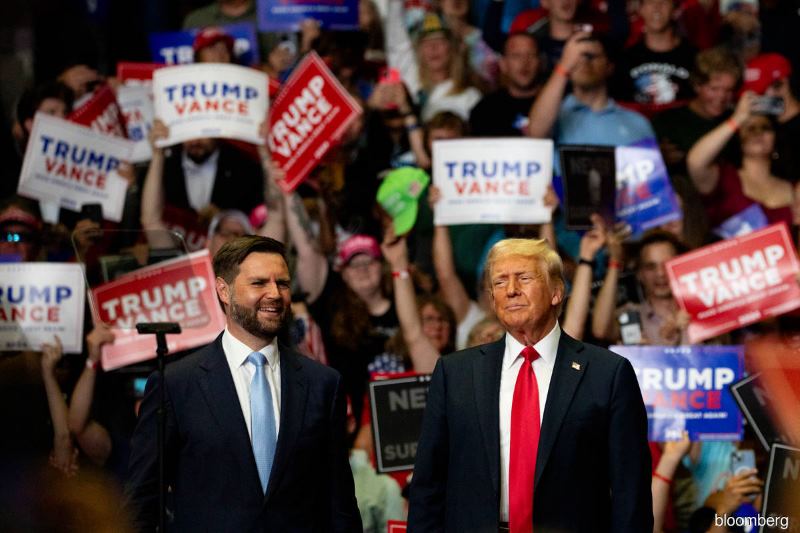U.S. News
Trump and Vance Propose Massive Tax Cuts
Republican nominee Donald Trump and his running mate JD Vance are pushing a bold tax cut plan totaling $10.5 trillion. This ambitious proposal spans the next decade, exceeding the combined budgets of all domestic federal agencies. Such a staggering figure raises serious concerns about fiscal sustainability and long-term economic impact. Critics argue it could strain the nation’s finances and lead to potential deficits. Supporters, however, believe it will stimulate growth and job creation in the economy.
Inadequate Offset from Spending Cuts
Eliminating all non-defense discretionary spending, projected to be $9.8 trillion over the next ten years, would not be sufficient to cover the projected cost of Trump and Vance ‘s expansive tax cuts. Initial cost estimates are based on preliminary analyses, as the Trump campaign has yet to release detailed policy specifics. The proposed cuts would significantly strain the federal budget.
Eliminating non-defense spending won’t cover Trump’s tax cuts; detailed policy specifics are needed, according to wsj news.
Campaign Promises and Financial Impact
The Trump campaign has promised to reduce wasteful spending and boost energy production to finance the tax cuts and mitigate national debt. However, specific details on how these measures will be implemented are lacking. The campaign’s vague promises raise questions about the feasibility and impact of their proposed fiscal policies.
Harris’s Tax Proposals: A Comparison
In contrast, Democrat Kamala Harris has put forward a more modest tax plan. Her proposals include exempting tips from taxes and expanding the child tax credit. Estimated at $2 trillion, her plan is significantly less costly compared to Trump’s. Harris aims to offset the financial impact by increasing taxes on corporations and high-income individuals.
Challenges to Passing Trump’s Proposals
The scale of Trump’s tax proposals makes full enactment unlikely, even with a supportive Congress. His plan includes extending the 2017 tax cuts, expanding the child tax credit, and introducing new exemptions. According to Kyle Pomerleau of the American Enterprise Institute, passing a $10 trillion deficit-financed tax cut would be unrealistic and face considerable legislative hurdles.
Economic Uncertainty and Legislative Implications
Republicans argue that tax cuts stimulate economic growth, yet the impact of Trump’s individual-focused reductions on overall activity remains uncertain. The proposed $10.5 trillion tax cuts could limit Congressional resources significantly. This limitation may affect essential functions like law enforcement and border security. International relations could also be impacted by reduced funding and resources.
Harris’s Approach to Deficit Reduction
Kamala Harris and President Joe Biden have proposed a detailed budget aimed at reducing federal deficits by $3 trillion over ten years. This plan includes raising taxes on corporations and high-income individuals. Previous attempts to implement similar measures have faced significant opposition from business groups, raising questions about their feasibility.

Wall Street’s August Revival A Period of Optimism
Wall Street’s August revival came just four weeks after a minor panic sent shockwaves through the financial markets, causing a temporary…
Future Congressional Action on Taxes
Tax policy will remain a key issue in Congress, regardless of the presidential outcome. Many provisions of Trump’s 2017 tax cuts are set to expire by the end of 2025. Trump plans to extend these cuts and introduce new measures, including lowering corporate tax rates. Exempting Social Security payments would add to the $10.5 trillion total cost.
Revenue Generation and Economic Effects
Trump and Vance have proposed limited revenue-raising measures, like universal tariffs, potentially generating $2.8 trillion over ten years. This proposal does not factor in possible negative economic impacts or trade retaliation costs. Federal Reserve Chair Jerome Powell has voiced concerns about unsustainable budget deficits. Moody’s Investors Service has warned of a potential downgrade of the U.S. credit rating. These financial risks could significantly affect the nation’s economic stability and global credit standing.
The Need for Comprehensive Plans
Keith Hall, former head of the Congressional Budget Office, emphasizes the need for detailed funding plans for tax cuts. Trump and Harris must present clear strategies to manage the financial implications of their tax policies. Comprehensive and transparent plans are crucial for tackling fiscal policy challenges. Ensuring economic stability requires addressing these complex financial issues thoroughly.
Seize this exclusive learning opportunity by enrolling in our Digital News Pairing Offer. Join curious minds who rely on The Washington Post and The New York Times for daily insight and profound viewpoints.

